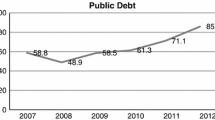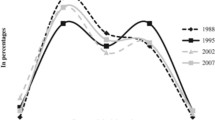Abstract
This article's aim consists in building and estimating a model which explains and forecasts the outcomes of the French legislative elections by department. This model, which constitutes the first attempt for such a geographical level, emphasises the role of the economic and political factors in the explanation of the legislative vote. The model seems to be very accurate in forecasting the elections of the past at the local and national level. Furthermore, its behaviour for the 2002 election was very satisfactory. This model is therefore a reliable alternative to the vote intention polls as an electoral forecasting instrument.
Similar content being viewed by others
References
Abrams, B. A. (1980). The influence of state-level economic conditions on Presidential elections. Public Choice, 35, 623–631.
Abrams, B. A., & Butkiewitz, J. L. (1995). The influence of state-level economic conditions on the 1992 U.S. Presidential election. Public Choice, 85, 1–10.
Budge, I. & Farlie, D. J. (1983). Explaining and Predicting Elections: Issue Effects and Party Strategies in Twenty-three Democracies. London: George Allen and Urwin.
Campbell, J. E. (1992). Forecasting the Presidential vote in the states. American Journal of Political Science, 36, 386–407.
Dubois, E. (2003). Les modèles politico-économiques explicatifs du vote en France, 1976–2003. University of Paris 1, LAEP: Working Paper.
Dubois, E., & Fauvelle-Aymar, C. (2004). Vote functions in France and the 2002 election forecast. In M. S. Lewis-Beck (Ed.), The French Voters: Before and After the 2002 Election. Palgrave Macmillan, pp. 205–230.
Fauvelle-Aymar, C., Lafay, J.-D., & Servais, M. (2000). The impact of turnout on electoral choices: An econometric analysis of the French case. Electoral Studies, 19, 393–412.
Greene, W. H. (2000). Econometric Analysis, 4th edn., Prentice-Hall.
Holbrook, T. M. (1991). Presidential elections in space and time. American Journal of Political Science, 35, 91–109.
Jérôme, B., Jérôme-Speziari, V., & Lewis-Beck, M. S. (1999). Polls fails in France: Forecasts of the 1997 legislative election. International Journal of Forecasting, 15, 163–174.
Jérôme, B., Jérôme-Speziari, V., & Lewis-Beck, M. S. (2003). Reordering the French election calendar: Forecasting the consequences for 2002, European Journal of Political Research, 42, 425–440.
Jérôme, B., Lafay, J.-D., & Lewis-Beck, M. S. (1993). Elections législatives de mars 1993: Prévisions politico-économiques par région. University of Paris 1, LAEP: Working Paper.
Kanji, G. K. (1993). 100 Statistical Tests. London: SAGE Publications.
Key, V. O. (1966). The Responsible Electorate: Rationality in Presidential Voting: 1936–1960. Cambridge, M.A.: Harvard University Press.
Kramer, G. H. (1971). Short-term fluctuations in U.S. voting behavior, 1896–1964. American Political Science Review, 65, 131–143.
Lafay, J.-D. (1993). Les prévisions des modèles politico-économiques. Le Figaro, March, the 19th.
Lafay, J.-D. (1998). Les interactions entre économie et politique. In La régulation des marchés : Quelles leçons pour la Russie en transition?, Symposium Proceedings (pp. 37–51). Haut Collège d'Economie, Moscow.
Lancelot, A. (1998). Les élections sous la Ve République, P.U.F., Paris.
Lewis-Beck, M.S., & Stegmaier, M. (2000). Economic determinants of electoral outcomes. Annual Review of Political Science, 3, 183–219.
Roger, P. (2002). Comment le FN peut faire chuter la droite aux législatives. Le Monde, May, the 9th.
Rosa, J.-J., & Amson, D. (1976). Conditions économiques et élections. Revue Française de Science Politique, 25(6), 1101–1124.
Rosenstone, S. J. (1983). Forecasting Presidential Elections. New Haven: Yale University Press.
Author information
Authors and Affiliations
Corresponding author
Rights and permissions
About this article
Cite this article
Auberger, A., Dubois, E. The influence of local and national economic conditions on French legislative elections. Public Choice 125, 363–383 (2005). https://doi.org/10.1007/s11127-005-3056-9
Accepted:
Issue Date:
DOI: https://doi.org/10.1007/s11127-005-3056-9




